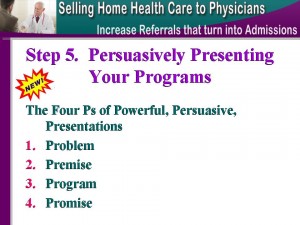Selling private duty home care to physicians is a real challenge. Most of them don’t get our business. They don’t understand the difference between home health and private duty home care. However there are exeptions.
Yesterday, I was on the telephone with the new client services coordinator for one of our clients. She had just started with the company in this role, but had worked as a hospital discharge planner for many years. She understands the referral process, but her boss – the owner of the company – asked me to spend some time helping her understand more about the private pay, non-medical home care business.
In the course of our conversation, I asked her how things were going after being on board one week. She said it was going well, and that she had booked two new clients, and was going out on Friday to conduct in-home assessments for two more prospects. She told me about one of the calls that was most interesting.
The phone rang, and it was a local cardiologist who had a patient sitting with him in the office. The patient had a high sodium count and the doctor wanted to know if the home care company knew anywhere that the patient could purchase prepared meals. The patient’s wife has recently passed away, and he was 97 years old and legally blind. He was only eating soup because it was easy to prepare, but the canned soups contained high levels of sodium.
The new client services coordinator offered to go out to the home and meet with the elderly gentleman to help work out a solution. She offered to send in a caregiver for three hours a day six days a week to prepare meals, do light housekeeping, and read to the client. She fixed his lunch, and prepared dinner for him so all he had to do was put it in the microwave.
The client was happy, the family was delighted as the oldest daughter lives in another city, and the doctor was happy because the patient’s sodium level is coming down. (Yes, I know. I’m using two different terms to refer to the same person – client and patient. To us, the elderly gentleman is a client. To the doctor, he is a patient. It’s important to use the right terminology in the right situation)
As part of the telephone coaching process, the new client services coordinator and I sketched out a sales presentation for this cardiologist, and other cardiologists. Then we adapted it to other physicians who have patients with high sodium because of diet. We used the Four P’s of a Powerful Persuasive Presentation from our workshop on “Selling Home Health Care to Physicians.” Step 5 in the seven step relationship selling process is to present your programs and services.
The four P’s:
1. Problem: Patient with Congestive Heart Failure and high sodium because he was only eating soup.
2. Premise: A home care caregiver can prepare healthy meals, make sure the client eats those healthy meals, and provide some companionship that can help address any depression brought on by the death of the spouse.
3. Program: A plan of care in which the caregiver works with a care manager or care coordinator to plan healthy meals, prepare the meals, make sure the patient eats the means and takes his medicine. The caregiver will also provide companionship which has the potential to help the client overcome any loneliness and depression, and be more motivated to take care of himself.
4. Promise: This program will improve the client’s diet, help reduce the sodium level, reduce the risk of complications from the CHF, and avoid the patient going back into the hospital.
Once we had prepared the presentation using this format, then the process is to identify other physicians who may have similar patients with similar conditions who will benefit from our home care program.
Normally, we have found that it is a tough sell trying to get physicians to understand non-medical home care, and be interested enough to make a referral. This example helped us see the potential to make a case for home care as preventive medicine using this specific example. Using the Four P’s model, we were able to craft a presentation for physicians that can be very powerful.
You can get private duty referrals from physicians. However, you need a “hook” to get past the gatekeeper and give you a reason to have a conversation with the doctor. Using this process can help.
What is your experience selling home care to physicians? How would this approach work for you?





